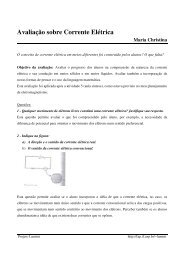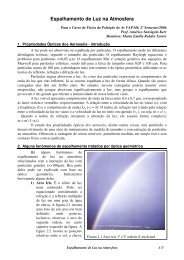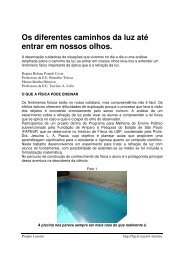Ryan Bailey (order #2639004) 173.14.196.1 - fap.if.usp.br
Ryan Bailey (order #2639004) 173.14.196.1 - fap.if.usp.br
Ryan Bailey (order #2639004) 173.14.196.1 - fap.if.usp.br
You also want an ePaper? Increase the reach of your titles
YUMPU automatically turns print PDFs into web optimized ePapers that Google loves.
<strong>Ryan</strong> <strong>Bailey</strong> (<strong>order</strong> <strong>#2639004</strong>) 1CHAPTER ONE: LIFE IN THE HIGH FIRST AGETHE TRIBUTARIESOnce, the tributaries were independent states whose rulers paid tribute to the Deliberative in exchange formoderate patronage, including protection from Creation’s enemies and access to the Deliberative’s technology.They existed beside truly independent states, those nations that went without Deliberative aid and sacr<strong>if</strong>iced easefor freedom.Since the Thousand Struggles Era, the Solars have ruled all Creation’s mortals. The last independent mortalnation fell in Year 1742.Now, the term tributary refers to a state ruled by a Solar Prince who wishes nominal immunity from the Deliberative’slaws. In exchange for the payment of lavish tribute and his agreement not to cast his votes in the Deliberative,a Solar tributary’s ruler may pass what internal laws he sees fit. He may promote blood sports, deny access to I AM,reduce minimum education standards, restrict travel opportunities, allow his mortal subjects to keep each other asslaves or anything short of engaging in experiments involving the manipulation of hun souls.Officially, the tribute these rulers pay goes to two causes. First, it prevents the tributary rulers from amassingresources sufficient to raise armies large enough to challenge the Deliberative. Second, it funds the additionalpaperwork necessary for the Department of Abstract Matters to account for the souls who pass through tributarystates. Under the Mandala Accord (see p. 47), only unremarkable souls may incarnate into tributary states, and nosoul may live two consecutive lives under tributary rule.Adjacent tributaries can war against each other as they see fit. They cannot legally wage war against prefectures.This protection goes only one way, however. Prefectures may war against tributaries, and tributaries maynot retaliate. In theory, the threat of unilateral military action <strong>br</strong>ought against them prevents the tributaries fromevolving in too repugnant a manner. In practice, many tributaries closely ally with neighboring prefectures. Thosethat don’t are quickly annexed.Most tributaries survive as sources of goods and services that prefectures cannot produce efficiently or don’twish to dirty their hands producing. A few survive because their ancient rulers possess power vastly beyond thatof their neighbors. Long bored with Deliberative politics and fully immersed in their own projects, many of themost ancient surviving Solars (and fully half of the remaining Golden Hero Vassals) rule tributaries rather thanprefectures. There they may engage in private pursuits away from the curious gazes and pestering questions of theiryounger fellows.CITIESThe Era of Dreams is an age of vast metropolitan areas.The smallest cities cover half a dozen square miles and holdat least 100,000 residents. The largest, such as Meru andChiaroscuro, hold more than 20 million people and covernearly 5,000 square miles. The scale of these cities is alsoreflected in their incredible height. The tallest urban towersin Creation are half a mile high and 350 feet across, and allbut the smallest cities boast at least a few towers a quarter milehigh. Despite their size, however, these cities share much incommon with the cities of very d<strong>if</strong>ferent eras. They are centersof trade, government, manufacturing and entertainment.Mortals who live in cities work in all of these occupations.Also, even discounting the rare mortals whose Essencehas been enlightened, the Solar Princes employ millions ofmortals as clerks, peacekeepers, nurses, soldiers, laborers inthe many thousands of factory-cathedrals and in many otherduties. Almost all of these individuals work in the cities ofCreation. Other mortals work in private commerce, buying,selling or simply loading and packing goods for ambitiousmerchants. Others are artisans working in either the few fieldssuch as making fine jewelry where handwork still dominatesor creating handmade versions of mass-produced goods suchas wine or clothing for sale to status-conscious mortals orExalts. Some urbanites work as artists, sculpting wood, metalor precious stones, writing plays or stories, painting detailedportraits or landscapes, or crafting dreams for recording or<strong>br</strong>oadcast. Even more work as actors, singers or musicians,or as the owners or employees of the hundreds or thousandsof taverns, restaurants, <strong>br</strong>othels and gambling parlors foundin every city in Creation.The pace of urban l<strong>if</strong>e is considerably faster than that ofrural areas, and mortals have much more of an opportunity toseek their fortune. Most are free to change careers wheneverthey wish. Urban l<strong>if</strong>e also offers access to both legal andillegal entertainment impossible to obtain elsewhere. Mostrural folk consider city l<strong>if</strong>e as exciting as it is dangerous anduncertain; most urbanites consider l<strong>if</strong>e outside the citieslimited and dull.While a mortal city planner must allow for his creationto last beyond his death, the Celestial Exalted cultivatecities as mortals cultivate gardens. Some few cities displaya singular vision, having been overseen by the same Solarsince their founding thousands of years ago. Others change20






